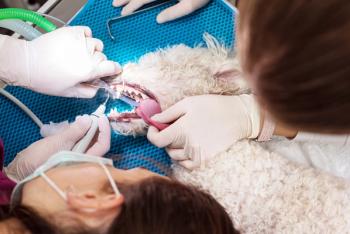
Journal Scan: Anticoagulant rodenticide screening may help determine prognosis
This study looked at whether such a screening is worth it and what it means if the results are negative.
Why they did it
When a patient is presented for evaluation of lethargy, collapse, decreased appetite, vomiting, dyspnea, or coughing, you might suspect rodenticide exposure. Is it worth it to perform a screening for common anticoagulants to predict the prognosis? And what does it mean for a patient if the results of such a screening are negative?
What they did
In a retrospective case series, researchers evaluated the results of anticoagulant rodenticide screening tests submitted to a veterinary diagnostic laboratory from January 1996 through January 2003. In addition to anticoagulant rodenticide testing results and physical examination findings, the following were recorded in patients selected for inclusion in this study: packed cell volume (PCV), total solids concentration, prothrombin time (PT), activated partial thromboplastin time (aPTT), platelet count, detailed treatment history, final diagnosis, and outcome.
Anticoagulant rodenticide screening included high-performance liquid chromatography analysis for:
- Brodifacoum
- Bromadiolone
- Chlorophacinone
- Coumafuryl
- Dicoumarol
- Difenacoum
- Difethialone
- Diphacinone
- Pindone
- Valone
- Warfarin
What they found
Among the 123 dogs tested, 75 (61%) had positive test results for anticoagulant rodenticide; 21 (28%) of these had no known toxin exposure. Anticoagulant rodenticide concentrations ranged from trace amounts to 1,120 parts per billion. The researchers found that anticoagulant rodenticide concentrations did not correlate with the severity of the clinical signs or degree of prolongation of coagulation times. The authors note that the lack of correlation between anticoagulant rodenticide concentrations and clinical sign severity may have been related to timing of the sample draw or previous therapy.
There was no difference in the most common initial clinical signs (lethargy or collapse, decreased appetite, vomiting, dyspnea, and cough) between the groups with positive and negative test results. The median PCV, total solids concentration, platelet count, and aPTT were also similar between the two groups, whereas initial median PT was significantly longer among dogs in the positive group (52 vs. 13 seconds, P < 0.001).
For those dogs that had negative results for the anticoagulant rodenticide testing (n = 48), the most common conditions diagnosed were neoplasia (31.3%), immune-mediated disease (14.6%), and gastrointestinal bleeding (10.4%). More dogs that had positive results survived compared with those with negative test results (98% vs. 63%, P < 0.001).
Take-home message
Anticoagulant rodenticide screening may allow clinicians to guide treatment decisions since severe coagulopathy and negative results for anticoagulant rodenticide screening were associated with a poor prognosis. For these patients, consider a work-up for underlying diseases such as neoplasia, liver failure, or immune-mediated thrombocytopenia.
Waddell LS, Poppenga RH, Drobatz KJ. Anticoagulant rodenticide screening in dogs: 123 cases (1996-2003). J Am Vet Med Assoc 2013;242(4):516-521.
Link to abstract:
Newsletter
From exam room tips to practice management insights, get trusted veterinary news delivered straight to your inbox—subscribe to dvm360.




